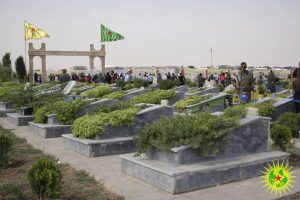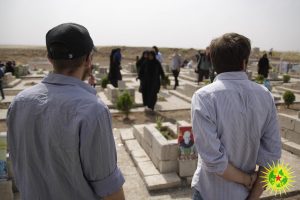Pictures of the şehids, or martyrs of the revolutionary struggle, are everywhere in Rojava. Backed by canary-yellow and forest-green YPG/YPJ livery, they stare out from roadside hoardings and the walls of schools and hospitals, from the phone backgrounds of comrades in the military and civilian structures, at the entrance to each city and in endless thousands across cemeteries like that outside the city of Derik – which you can see pictured here.
Their constant presence is painful, but also joyful and inspiring. At the Internationalist Commune we likewise strive to remember and give meaning to those martyrs who gave their lives in order to free the Kurdish people from oppression, and build up a democratic-confederalist alternative to brutal state repression here in Rojava.
Whether Kurdish, Arabic or otherwise, traditional local cultures place great value on remembering the dead. Many of the graves we recently saw in the şehidlik at al-Hasekah had a plastic bottle of lentils, beans and rice placed at their head: an old tradition providing “food for the road afterward”, as a Kurdish friend explained.
At another recent ceremony for the end of Ramadan at the şehidlik (martyrs’ cemetery) at Derik, women in black widow’s weeds let out ululating cries of grief, sprawled over the graves of husbands, daughters and sons. Meanwhile children ran happily through the massive crowd, sharing out sweets and darting between freshly-watered floral displays.

The Kurdish liberation movement of course draws on these ancient traditions of respect and commemoration, but our gaze is on the road before the grave as well. We don’t just remember the martyrs out of grief, and nor do we glorify death for its own sake.
Internationalist Commune member Heval Merwan has spent almost a year altogether in Rojava, and as a result he has several close personal friends who have fallen şehid. “It’s a responsibility we have on our shoulders to continue the fight,” he says. “To put their dreams and their thoughts in practice, to walk on along the way. It’s something difficult, something hard and something sad. For this, we have these collective moments of remembering and minutes of silence.”
He gives the example of Şehid Zana Ciwan, a friend whose example – “calm, convinced, open for contradictions” – he tries to emulate in these uncertain times. Ş. Zana is particularly in his thoughts at this time, as he fall sehid following the first Turkish air strike on Rojava’s soil in Manbij. Zana fell “because the revolution spread” to the contested city, but also because of American “dirty games” which continue in the same city today, two years down the line.
“To put their dreams and their thoughts in practice, to walk on along the way… It’s something difficult, something hard and something sad.”
Quite simply, this revolution and our academy would not be here without the sacrifices of Ş. Zana and others like him. Pictures of fallen revolutionaries, from Black Panther Fred Hampton to the members of the YPG media team killed by Turkish bombs last year in the Qerecox mountains, line the walls of the academy and our sleeping quarters. Through this, we can remind ourselves of a struggle which far exceeds the commune in both time and space: of Mazlum Doğan self-immolating in Amed prison 35 years ago, of friends laying down their lives on the front line in Afrin today.
Internationalist YPJ fighter Heval Şilan, a friend of ours at the commune, recently told internationalist radio project Vedeng how she took the memory of the şehids with her herself as she continued the struggle in Afrin. “YPJ is a temple of that ideology,” she says. “That hevalti (comradeship) with friends where you risk everything.
“Half of the friends we went to Afrin with not here, they are şehid… they are here but not physically… I really, really want to say they are here, the place we are, everything we do every day… it’s them.”

Abdullah Öcalan writes that the martyrs are the truest revolutionaries of all, dying in a struggle which continues to the very last second of their lives. For example, he describes the female martyr Şehid Zilan, who was self-martyred during a bomb attack on a Turkish military parade in 1996, as his “commander”. It was an act which rejuvenated the Kurdish liberation struggle, in particular forcing advances in the role of women within the movement. Male revolutionaries steeped in patriarchal snobbishness were forced to accept that women, too, were seriously committed to the cause.
By following this example, we try to give a revolutionary meaning to all our works and daily life here – including work we find exhausting, boring or uninspiring. Can we face another early morning digging trenches in the garden? Should we bother saving these half-eaten pieces of nan for the next meal, or throw them into the trash? When we remember the sacrifices which made them possible, we can see the value of each piece of food that we share, of each brick laid in the academy, of each moment we spend together as hevals.
In a note explaining her actions, Ş. Zilan says: “My will to live is very strong. My wish is a fulfilling life through great action.”
This is why we say şehid namirin (martyrs never die.) Their bodies may be in the ground, but their works continue in the streets and fields of Rojava today, and through this continued struggle they remain alive.
Heval Merwan recalls spending time with a friend from Bashur. They drank chai together one morning: he was dead by the afternoon. ‘I remember the şehids because I know how fast people can die,” he says. “Remembering how important it is to build up friendship with everyone here in the Internationalist Commune, not just those who I would be friends with in Europe.”
“Morale is also important,” he continues, referring to the fireside evenings where we share revolutionary songs, laughter, and the stories and memories of şehids from across the globe. “I have it in my mind that we create collective energy, they are with me in my head and give me strength to continue. But of course, it’s not easy. “
“Their bodies may be in the ground, but their works continue in the streets and fields of Rojava today, and through this continued struggle they remain alive.”
This is why our academy is named after Helin Qerecox (Anna Campbell), the British comrade who recently fell şehid in Afrin while resisting the brutal attacks of the fascist Turkish state. Helin was a friend of many of our hevals here at the academy, and joined in the first meal eaten on this site. Later in her radio interview, heval Şilan recalls laughing and singing the pop song Umbrella with Şehid Helin as they sheltered – under an umbrella – from Turkish drones on the frontline. Shortly after, she fell.
When we were joined by a hundred Kurdish and international friends for a morale with songs, dance, drama and food to mark the end of our first education here, we began with a minute’s silence for Helin and all the other şehids. In between the laughter and music, we made space to reflect on the countless lives laid down to make these moments of joy possible. And when the moment’s silence was over, we laughed and sang all the louder as a result.
Şehid namirin!
